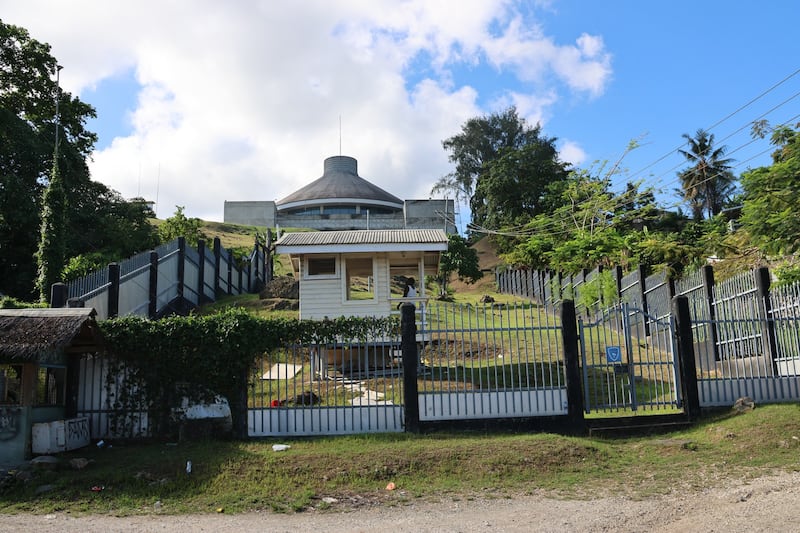Manasseh Sogavare, the pro-Beijing prime minister of the Solomon Islands, commands the largest bloc in Parliament after elections last week, but fell short of a majority and faces several rivals for leadership of the Pacific island country.
A consecutive term for Sogavare is a possible flashpoint for the economically struggling country where many voters are frustrated by stagnating living standards. The outcome is also being watched by governments from China to Australia and the United States as they jostle for influence in the Pacific.
Sogavare’s Ownership Unity Responsibility Party, known as OUR, won 15 seats in the 50-member Parliament, state media and election commentators said Wednesday – well short of the numbers needed to elect Sogavare prime minister after independents and opposition parties unseated some of his loyalists.
“At a minimum the message is pro-change,” Jaydee Nomisasa, a commentator on Solomon Islands politics, told RFA-affiliated news organization BenarNews.
“Predominantly it’s the dissatisfaction with the way things have been going economically – a 20 kilo bag of rice, which was costing 90 [Solomon Islands] dollars, 100 dollars five years ago, is now something like 200 dollars.”
The Apr. 17 election in the country of 700,000 people was the first since Sogavare switched diplomatic recognition to China from Taiwan in 2019 and signed a security pact with the superpower. Dissatisfaction with the diplomatic switch culminated in economically ruinous riots in the capital Honiara in late 2021.
Sogavare retained his East Choiseul constituency in a close first-past-the-post race. His share of votes in the seat was down more than 10 percentage points from 2019, official results show.
He acknowledged his “very small” winning margin, in an interview broadcast by Solomon Islands news site Tavuli News on Wednesday, and appeared to blame the U.S. and its allies for the decline in his support.
“There have been a number of decisions [by the Cabinet] that did not go down well with the international community, especially the Western allies led by the United States of America,” he said.
Campaigning in the constituency included claims the U.S. “would be doing a lot of things for East Choiseul, would be building this, building that,” Sogavare said.
Despite the apparent backlash against the government, Sogavare still seems in a strong position to be prime minister again, said Nomisasa, who estimates he already has at least 19 members of Parliament in his camp.

Mihai Sora, a Pacific analyst at the Lowy Institute think tank, said Sogavare, former prime minister Gordon Darcy Lilo – who won the Central Honiara constituency with a landslide majority – and Sogavare’s Foreign Minister Jeremiah Manele are considered contenders to become prime minister.
Matthew Wale, who was opposition leader in the last Parliament, and Peter Kenilorea Jr., son of the Solomon Islands’ first independence-era prime minister, are also in the picture, he said.
“If opposition figures like Peter Kenilorea Jr. or Matthew Wale are successful in forming a government, there is some scope to slow or reverse the trend of increasing Chinese influence in the country. But in some ways that horse has bolted,” said Sora.
“Much still depends on how the new government is formed, who takes the top job, and what promises were made along the way.”
Wale’s Coalition for Accountability Reform and Empowerment, known as CARE, has 13 seats in Parliament and Kenilorea’s United Party won seven. Both parties substantially increased their share of the vote from the 2019 election.
Independents hold 10 seats and the remainder is shared among smaller parties.
There are no figures from the 2019 election for the OUR party. Sogavare was elected as an independent in 2019 and subsequently brought together independents and others to form a majority under the banner of OUR, which was registered as a party following the election.
Going into last week’s polls, voters interviewed by BenarNews in Honiara and other areas of Guadalcanal said they were frustrated by the government’s ineffectiveness in providing basic services and preoccupied by the daily struggle to earn enough to get by.
Crumbling roads and run down health clinics were a common complaint as were high prices in mostly Chinese-owned shops in Honiara. In a village kilometers from the capital, one resident said he hoped the community could get bore water and proper toilets rather than having to dig pits in the ground.
Anti-China sentiment appeared to be a factor in voting in Malaita, the most populous province, where a prominent Beijing critic, Daniel Suidani, was reelected to the provincial assembly after being ousted as premier last year.
Hundreds of police and troops from Australia, Fiji, Papua New Guinea and New Zealand provided security for the national and provincial elections, which were also monitored by nearly 400 independent observers.
Based on past experience, there could be prolonged negotiating and horse trading among members of Parliament to choose a prime minister and form a government, analysts said.
“At this very early stage in the political bargaining process, it’s still anyone’s game to win,” said Sora, a former diplomat in the region.
BenarNews is an RFA-affiliated online news organization.

